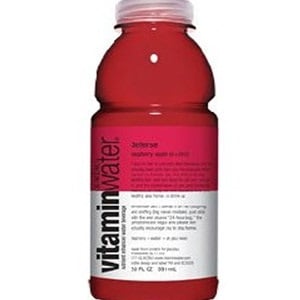
Coca-Cola's VitaminWater is being marketed as a healthy, hydrating, and rejuvenating drink. The bottles are beautiful, colourful, and the text is snappy and clever. Empowering words like “endurance”, “energy”, “essential”, and “focus” are used liberally. It is obvious that a lot of thought went into the marketing of this product, however, it appears to be nothing more than sugar water.
Just have a look at the list of ingredients:
Vapor distilled water, crystalline fructose, citric acid, caffeine, ascorbic acid (vitamin C), gum Arabic, natural flavor, electrolytes (calcium, magnesium, and potassium), gum ester, zinc picolinate, vitamin E acetate, vitamin A palmitate, niacin (B3), pantothenic acid (B5), beta carotene, Siberian ginseng and guarana extracts, cyanocobalamin (B12), caramel color, pyridoxine hydrochloride (B6)
VitaminWater contains water, sugar and a few added vitamins. Though the beverage comes in a range of fruity flavours, it contains no real fruit.
VitaminWater's sugar levels are exceptionally high. According to the South African label the beverage contains 5.4 grams of sugar per 100ml and 96kJ which means that if you drink a 500ml bottle, you will have consumed 27 grams of sugar and 478kJ. That's about 8 teaspoons of sugar!
The few vitamins added to the drink can’t cancel out the sugars and additives in a beverage - you are much better off gaining these nutrients from your diet (or a multivitamin if necessary). A homemade smoothie with fresh fruit, for example, would be far more nutritious.
With all this in mind, how can Coca-Cola get away with marketing VitaminWater as a healthy drink?
Lawsuit
In 2009 the Coca-Cola Company was served notice of a class action lawsuit filed by North American food-health advocacy group the Centre for Science in the Public Interest (CSPI) over the company’s deceptive and unsubstantiated claims on its VitaminWater line of beverages.
According to the CSPI, Coca-Cola marketed VitaminWater as a healthful alternative to soda by labelling its several flavours with health buzz words and making a wide range of dramatic claims, including that the drink reduced the risk of chronic disease as well as eye disease, promoted healthy joints and supported optimal immune function.
"In fact, the sugar in each bottle of VitaminWater does more to promote obesity, diabetes, and other health problems than the vitamins in the drinks do to perform the advertised benefits listed on the bottles," the CSPI nutritionists reported in the CSPI's original complaint.
Using its lawyers, Coca-Cola tried to argue its way out of the CSPI lawsuit, however, this was rejected by the courts and the company’s motion to dismiss the lawsuit, was denied.
'Exploitation and deception'
According to Judge John Gleeson of the US District Court for the Eastern District of New York “the names of the drinks, along with other statements on the label have the potential to reinforce a consumer's mistaken belief that the product is comprised of only vitamins and water".
CSPI's litigation director Steve Gardner added: "For too long, Coca-Cola has been exploiting people’s desire to eat and drink more healthily by deceiving them into thinking that vitamin water can actually prevent disease. In fact, VitaminWater is no more than non-carbonated soda, providing unnecessary added sugar and contributing to weight gain, obesity, diabetes, and other diseases. We look forward to representing everyone whom Coke has deceived." A final verdict is yet to be reached in court.
In the meantime, Britain’s Advertising Standards Authority ruled early in 2011 that Coca-Cola broke advertising rules when it described its VitaminWater as "delicious and nutritious" in an advertisement. The UK media watchdog explained that consumers wouldn't expect a drink marketed as nutritious to have between four and five teaspoons of added sugar.
Image: Sugar cubes in a glass
What is the situation in South Africa? Isn’t it time for South African consumers to start questioning the unsubstantiated claims of VitaminWater as well?
To date South Africa’s advertising regulator, the Advertising Standards Authority (ASA), has received no complaints about VitaminWater. “ASA can only re-act when they receive a complaint from a consumer or competitor, “says Corné Koch, ASA communications manager.
According to Koch, ASA is a re-active body and does not monitor advertising in South Africa. “This body has been set-up and is paid for by the marketing and communications industry to ensure that the system of self-regulation works in the public interest. The code has also been set-up to ensure professionalism among advertisers. We are only the ‘referee’ and provide a dispute resolution service when there is a dispute (complaint) about advertising from either a consumer or a competitor,” she explains.
Koch adds that there is a Code of Advertising Practice that all advertisers should adhere to. “According to the Code of Advertising Practice, advertising should be legal, decent, honest and truthful and its contents should not violate any laws of the country. In general, these are the main principles.”
Health24 approached Coca-Cola South Africa for comment, but to no avail. At the time of publishing, e-mail and telephonic queries remained unanswered.
Read more:
How to avoid health scams
Power Balance bracelet scam unravelled
Any questions? Ask DietDoc




 Publications
Publications
 Partners
Partners















